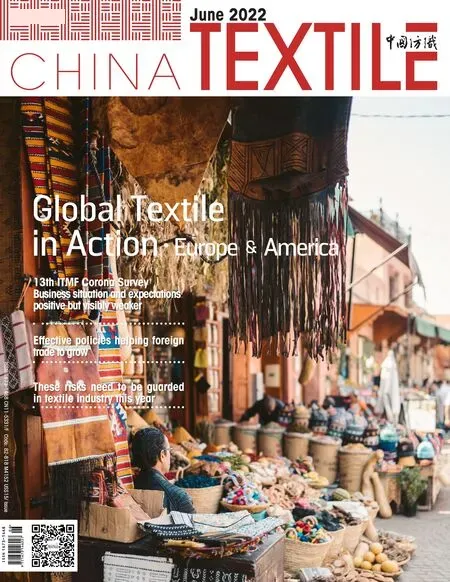France cooperates with EU institutions to try to get out of trouble
By Zhao Xinhua
In the French industrial industry, almost one out of every ten enterprises is related to the textile and garment industry. French clothing industry is famous for its high fashion cus—tomization, and the combination of its traditional skills and contemporary science and technology has a great influence on the creation of high fashion. Paris Fashion Week is one of the four famous French fashion weeks, and is recognized as the fashion capital of the world. In addition, France is the sixth largest exporter of textile machinery in the world, and it is in a leading position in the world in the fields of long fiber spin—ning, yarn twisting, setting dyeing and finishing, nonwovens, felt belt for finishing process, textile material recycling, etc.
Most imported textiles come from Asia
China exported more than $32 billion of apparel and accessories to the EU in 2021, up 21 percent from 2020. The top five exporting countries are Germany (19 percent), France (15 percent), the Netherlands (13 percent), Spain (11 percent) and Italy (8 percent), with France in second place, according to China Customs.
French Customs' statistics also show that cloth—ing produced in France accounts for only 2.5 percent of French consumption and 5 percent of value. Most imports come from Asia, especially in the upstream stages of the industry (fiber production, spinning, weaving/knitting, fin—ishing). France imports about 40 percent of its textiles and clothing from the RCEP countries.
In recent decades, the French textile industry has been committed to increasing its investment in innova—tion, skill development and enhancing international com—petitiveness. Between 2016 and 2018, 41% of French enterprises carried out innovation and upgrading. By 2021, the Instituto Nacional de Propriedade Industrial (INPI) had received about 14,800 patent applications.
Digital transformation enhanced the vitality of the industry
As in other parts of the euro zone, the economic re—covery of French economic activities began to slow down in post—pandemic period due to the conflict between Russia and Ukraine. The European Union launched the Important Projects of Common European Interest (IPCEI), which is committed to transnational industrial cooperation projects. Support has been provided for projects to rebuild inde—pendent production chains, including the French textile and clothing industry. In addition, the Union des Industries Textiles (Uit) explicitly supported these suggestions in the white paper, and put forward specific suggestions to meet the current challenges. Yves Dubief, president of the Union des Industries Textiles, summed up three strategic priorities: improving competitiveness, ecological and digital transfor—mation, and the attractiveness of the industry.
In order to strengthen the standards of sustainable development and make it easier for small and medium—sized enterprises to make profits, France will amend the European public procurement regulations. For products from extra—EU countries, production requirements equiva—lent to those of French and European companies will also be formulated. In addition, France will support industrial exports through the GSP reform to enhance its interna—tional influence. In addition, France will also address the challenges of ecological and digital transformation by pay—ing attention to the ecological responsibility of enterprises. Speed up the development of solutions to meet envi—ronmental challenges and make textile enterprises enter Industry 4.0. At the same time, France has introduced many policies to reduce the environmental impact (energy, water, waste, etc.) of textile enterprises, and encourage environmental display and traceability.
France's textile and garment industry hopes to get out of the current predicament, overcome economic chal—lenges, reduce the impact of the pandemic on the industri—al chain, deal with energy and environmental emergencies, achieve transcendence and create a more sustainable and productive future through cooperation with European in—stitutions such as EURATEX.

